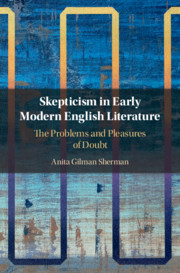Book contents
- Skepticism in Early Modern English Literature
- Skepticism in Early Modern English Literature
- Copyright page
- Dedication
- Contents
- Acknowledgments
- Introduction
- Chapter 1 Visionary, Interrupted
- Chapter 2 Fantasies of Private Language
- Chapter 3 Conformity / Neutrality in Lord Herbert of Cherbury
- Chapter 4 The Skeptical Fancies of Margaret Cavendish
- Chapter 5 The Enchantments of Andrew Marvell
- Afterword
- Bibliography
- Index
Chapter 3 - Conformity / Neutrality in Lord Herbert of Cherbury
Published online by Cambridge University Press: 16 April 2021
- Skepticism in Early Modern English Literature
- Skepticism in Early Modern English Literature
- Copyright page
- Dedication
- Contents
- Acknowledgments
- Introduction
- Chapter 1 Visionary, Interrupted
- Chapter 2 Fantasies of Private Language
- Chapter 3 Conformity / Neutrality in Lord Herbert of Cherbury
- Chapter 4 The Skeptical Fancies of Margaret Cavendish
- Chapter 5 The Enchantments of Andrew Marvell
- Afterword
- Bibliography
- Index
Summary
Herbert of Cherbury saw himself as a peacemaker. In De Veritate (1624) Herbert posits that religious conflict will disappear once people realize that they share core beliefs, monotheistic essentials he dubs the Common Notions in a nod to Stoicism. He proposes to refute skepticism by isolating criteria for truthful cognition: chiefly, conformity and consent. Why did Herbert, a champion of truth and enemy of skepticism, end up embracing skeptical impartiality and neutrality? The chapter argues that Herbert changes owing to his experiences during the Civil War and as a diplomat, but also following his work of the 1630s, composing his histories:Expedition to the Isle of Rhé and The Life and Reign of Henry VIII. Yet the seeds for this change are already present in his philosophy of mind, growing out of the appreciation for beauty implicit in his ideals of conformity and consent. The chapter shows that the corollaries of Herbert’s philosophy extend beyond political accommodation to neutrality and aesthetic detachment. Herbert’s work constitutes a valuable case-study of the connections forged between epistemology and politics in the turbulent second quarter of the seventeenth century.
- Type
- Chapter
- Information
- Skepticism in Early Modern English LiteratureThe Problems and Pleasures of Doubt, pp. 92 - 136Publisher: Cambridge University PressPrint publication year: 2021



